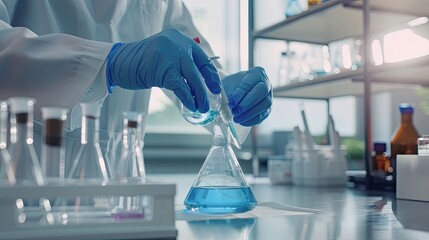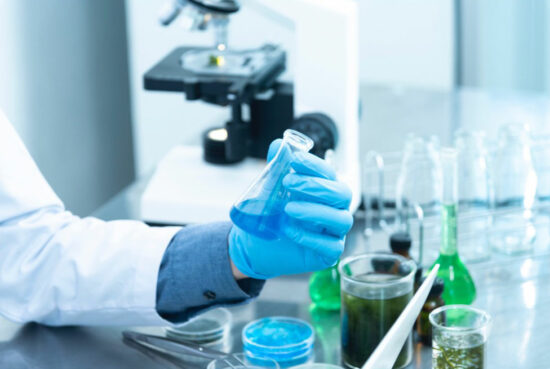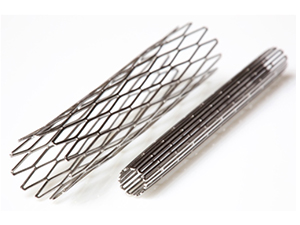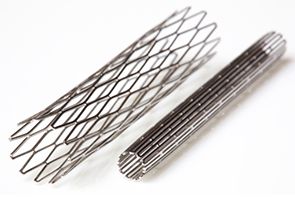News & Events
 In the world of medical device manufacturing, form, function, and finish are tightly interconnected. Behind every successful implant, instrument, or surgical tool is a rigorous process that ensures cleanliness, biocompatibility, and long-term durability. One of the most important finishing steps in this process is electropolishing, a precision surface treatment that goes far beyond aesthetics.
In the world of medical device manufacturing, form, function, and finish are tightly interconnected. Behind every successful implant, instrument, or surgical tool is a rigorous process that ensures cleanliness, biocompatibility, and long-term durability. One of the most important finishing steps in this process is electropolishing, a precision surface treatment that goes far beyond aesthetics.
 In a world where one-size-fits-all solutions rarely suffice, RBP Chemical Technology offers something more powerful: chemistry tailored to you. Through our custom chemical blending services, we deliver precisely formulated solutions that address the unique demands of each customer, whether in printing, electronics, medical devices, or beyond.
In a world where one-size-fits-all solutions rarely suffice, RBP Chemical Technology offers something more powerful: chemistry tailored to you. Through our custom chemical blending services, we deliver precisely formulated solutions that address the unique demands of each customer, whether in printing, electronics, medical devices, or beyond.
The printed circuit board (PCB) industry is constantly evolving, driven by the demand for higher performance, cost efficiency, and sustainability. Traditional electroless copper processes, while effective, often come with high costs, complex waste treatment, and space-consuming equipment. RBP Chemical Technology’s ONYX provides a cutting-edge alternative—an advanced direct metallization process that transforms PCB manufacturing.
 The medical device industry is one of the most demanding sectors, requiring precision, reliability, and innovation. Among its critical components are implants, medical devices designed to replace or support biological structures. Ensuring the functionality and longevity of these implants is paramount, and this is where RBP Chemical Technology’s expertise in specialized chemistries comes into play.
The medical device industry is one of the most demanding sectors, requiring precision, reliability, and innovation. Among its critical components are implants, medical devices designed to replace or support biological structures. Ensuring the functionality and longevity of these implants is paramount, and this is where RBP Chemical Technology’s expertise in specialized chemistries comes into play.
![]()
The print industry is evolving rapidly, driven by technological advances, changing customer expectations, and growing environmental concerns. Today’s printers need to deliver high-quality results faster, more efficiently, and with a reduced environmental impact. Whether you’re running traditional offset presses or digital print machines, the right chemical solutions can significantly enhance your printing capabilities, helping you meet customer demands while staying competitive in a dynamic market.

As we wrap up 2024, we want to take a moment to reflect on a truly special milestone for RBP Chemical: our 70th anniversary. This year marked seven decades of innovation, collaboration, and growth, and we could not have done it without the continued support of customers and partners like you.

Fort Carson unveils its groundbreaking battery system, the largest of its kind, marking a significant step forward in sustainable energy innovation for military installations
RBP Chemical Technology, a leading provider of proprietary chemicals and delivery devices for the electronics and defense industries, proudly participated in a recent Lockheed Martin Aeronautics and Engineering Systems (LMAES) event. As one of approximately five select contractors invited, RBP highlighted its cutting-edge electrolytic chemistry solutions that are integral to Lockheed Martin’s advanced defense systems. This is the first fluid battery produced and installed by LMAES.

The demand for high-performance electronics continues to skyrocket, driving innovation in designing and manufacturing Printed Circuit Boards (PCBs). As these components become more complex, the margin for error shrinks. Manufacturers face mounting pressure to enhance production speed, accuracy, and quality while minimizing defects and waste. The right chemical solutions can be critical in optimizing the PCB manufacturing process, leading to improved performance and cost-efficiency. RBP Chemical Technology’s tailored solutions help PCB manufacturers streamline their processes, reduce waste, and meet the most stringent performance standards.

RBP Chemical Technology, a Milwaukee-based leader in developing and delivering proprietary chemicals and devices for diverse industries, has been awarded the 2024 Governor’s Export Achievement Award. Recognized alongside Imbed Biosciences, UW–Milwaukee, and Inpro Corporation, RBP’s award highlights its impactful contributions to Wisconsin’s economy through a steady expansion of exports that extend across North America, Europe, and Asia. Founded in 1954 and celebrating its 70th anniversary this year, RBP continues to uphold its legacy of innovation and commitment to quality, producing advanced surface chemistry solutions in its ISO 9001:2015 certified Milwaukee facility, with additional manufacturing operations in Chennai, India.
Chemistry plays a vital role in medical device manufacturing, ensuring that products are safe, durable, and effective. From sterilization to enhancing materials and ensuring regulatory compliance, chemical processes are critical at every step of device production. As the medical device industry faces increasing regulatory pressure and demand for innovative solutions, chemical advancements are becoming more essential than ever.



